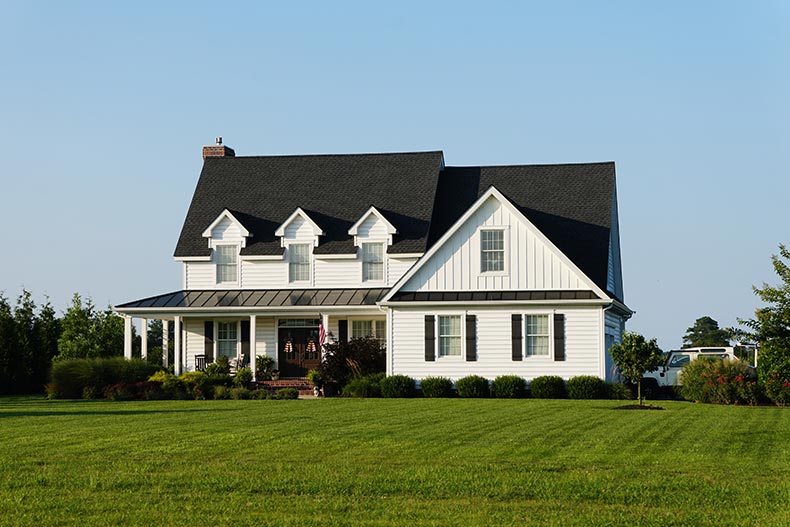Known for its rich American history and idyllic Atlantic Coast beaches, Delaware continues to grow as a top retirement destination in the Northeast. Yet a large portion of the First State’s appeal to active adults comes from its tax-friendly environment.
To help active adults better understand Delaware retirement taxes, we’ve put together a comprehensive guide to everything you need to know about taxes in Delaware. Keep reading to learn why this northeastern state keeps its taxes cheap for retirees who seek a high quality of life along the Eastern seaboard.
Delaware Income Tax

Delaware utilizes a graduated income tax system to levy taxes on its citizens. For those unfamiliar with this structure, it implies that the more one makes, the higher the income tax rate they must pay. The system has tax brackets with different levels of what percentage is due.
In Delaware, the income tax starts at 2.2% for those with an income of $2,000 to $5,000, then gradually increases until it reaches its maximum of 6.6% for those who bring in more than $60,000 a year.
Active adults considering moving to the state’s largest city, Wilmington, should also know that the city collects its own income tax of 1.25%. This tax only applies to those who live or work within the city.
Retirement Income Tax
For many active adults, Delaware retirement taxes represent one of the most important aspects of the state’s tax climate. Luckily, the First State is relatively tax-friendly to its retirees when compared to other states.
Delaware does not tax Social Security benefits, which many active adults rely on as a primary source of income. When it comes to other types of retirement income, there is more good news. Delaware does levy an income tax from all other sources of retirement income, including IRAs, 401(k)s, pensions, and income from interest. However, the state offers an age-based income exemption for retirement and ordinary income.
The exemption deducts $2,000 from all income for those under 60, and then it deducts up to $12,500 for taxpayers 60+. Any income over $12,500 for those who are 60+ is taxed using the state’s normal graduated income tax. Retirees should consult a trusted tax professional to understand how exemptions apply to them.
Delaware Property Taxes

When it comes to property taxes, Delaware does things a little differently than other states. In other states, a home’s value is often assessed by a property assessor each year to determine a home’s true market value. Then, the homeowner must pay a tax based on that value.
However, counties and cities in Delaware tax all homeowners based on the value of their property when it was assessed at a specific date more than 30 years ago. Each of Delaware’s three counties (yes, only three) held what they call a reassessment year through the 1970s and 1980s to determine property values, and those same values are what are taxed today. The reassessment year was 1974 for Sussex County, 1987 for Kent County, and 1983 for New Castle County.
So what does all this mean? It means that property taxes in Delaware are considerably lower than most states in the nation. The median home value, according to when they were assessed over 30 years ago, ranges from around $226,000 to $269,700 and the tax rate is 0.42% for Sussex County, 0.56% for Kent County, and 0.85% for New Castle County. Homeowners in the most expensive county for property taxes, New Castle County, pay a median property tax payment of $2,258 a year, with the payments in the other two counties averaging almost half of that amount.
Delaware cities also have their own property taxes, but due to the low assessed value of properties, these expenses are often minimal. For example, Wilmington is the largest city in the state and their property tax takes $1.995 of every $100 of a home’s value from when it was assessed in 1983.
Property Tax Exemptions
Despite Delaware’s ordinary policies that already make it very tax-friendly for active adults, qualifying retirees can also claim some exemptions that make taxes even more affordable. By ensuring only a reasonable portion of their income goes to taxes, active adults can live a comfortable retirement with financial peace of mind.
One statewide exemption is the school property tax credit for seniors, which applies a credit up to 50% of school property taxes or a maximum of $500 each year. Homeowners must be 65+ and meet other requirements.
For retirees considering a home in Wilmington, the city throws active adults a bone in the form of a $565 exemption on their property taxes, given they meet the proper criteria.
Other Delaware Taxes

Sales Tax
Delaware does not collect a sales tax on the state or local level. Delaware includes itself as one of only five states in the nation that do not have a sales tax, with the other four being Alaska, Montana, Tennessee, Oregon, and New Hampshire.
Gas Tax
Delaware drivers need to pay a tax when they fill up the tank, but it’s actually one of the lowest gas taxes in the country. In taxes, Delawarians pay $0.23 per gallon for gasoline and $0.22 per gallon for diesel. This means if a car takes 14 gallons of gas, the tax will cost about $3.22 in Delaware.
Estate/Inheritance Tax
Residents of Delaware do not need to worry about an estate or inheritance tax because the state did away with it in 2018. However, for cases that arose prior to 2018, a tax may still need to be levied from an estate depending on specific circumstances. The federal government still taxes an estate that exceeds multi-million-dollar thresholds which raises annually.
Intangibles Tax
Delaware does not tax intangibles, which is one of several aspects that make the First State a great place to conduct business. Income generated from assets that have no physical presence, such as royalties on art or trademarks for brands, may be subject to an intangibles tax in other states.
Delaware Is A Tax-Friendly State in the Northeast
With no sales tax, shockingly low property taxes, and some exemptions for retirees, Delaware is one of the most tax-friendly states in the Northeast and the entire country. If this guide has helped persuade you to retire to the First State, then consider sticking with us as we help you find your dream home in a 55+ community. Our real estate experts know all the ins and outs of the Delaware housing markets and which age-restricted communities would fit your needs best. Reach out today!







